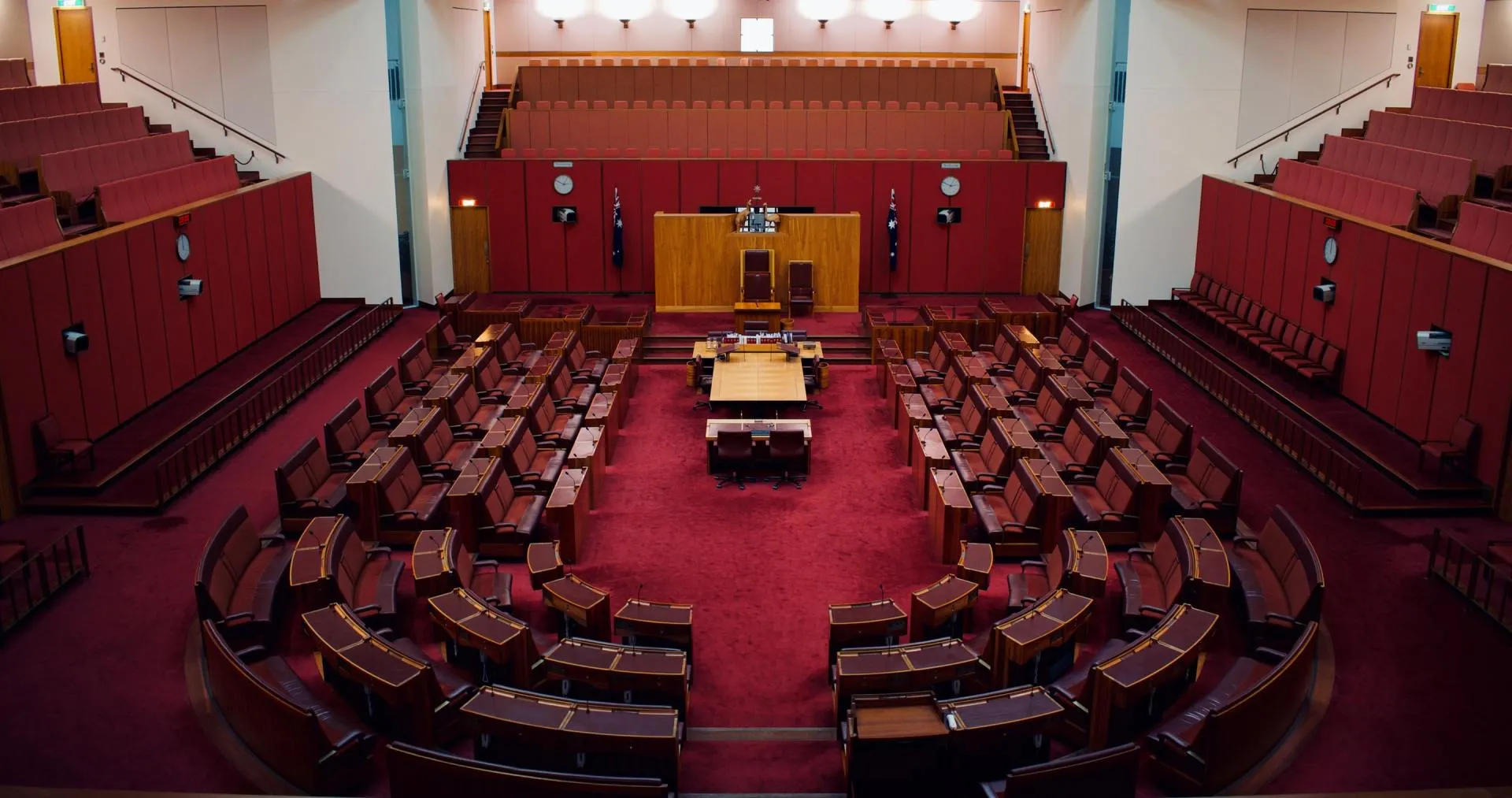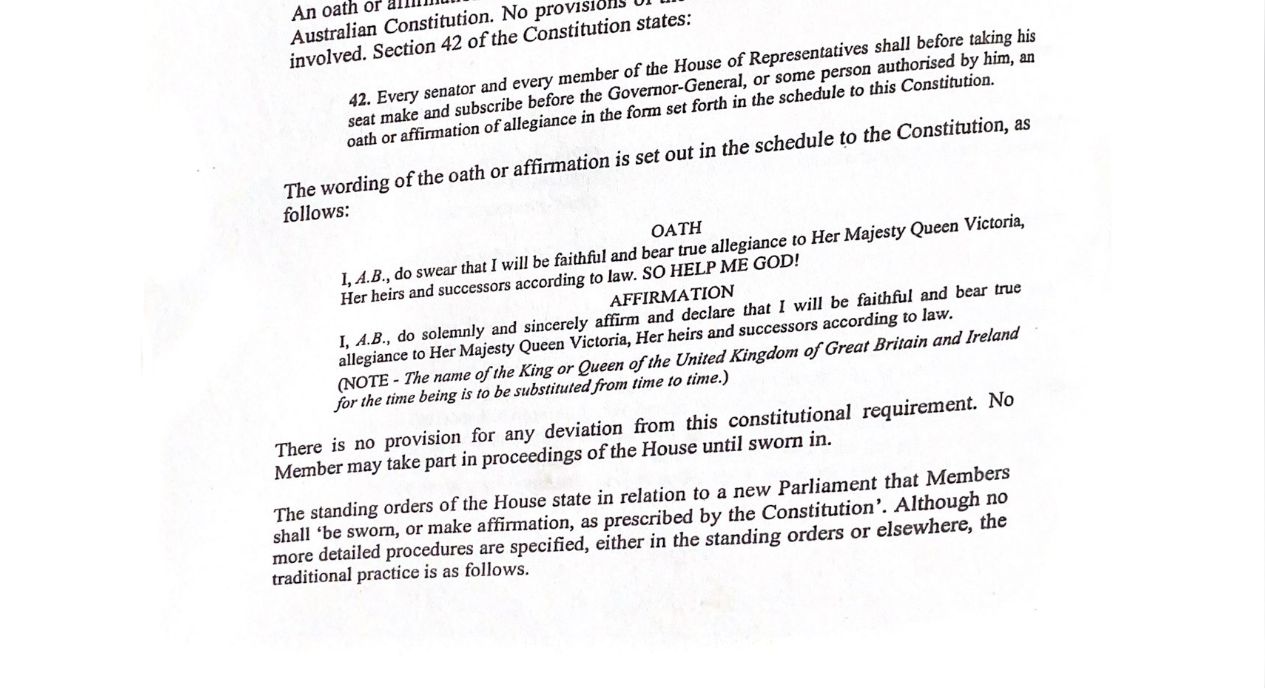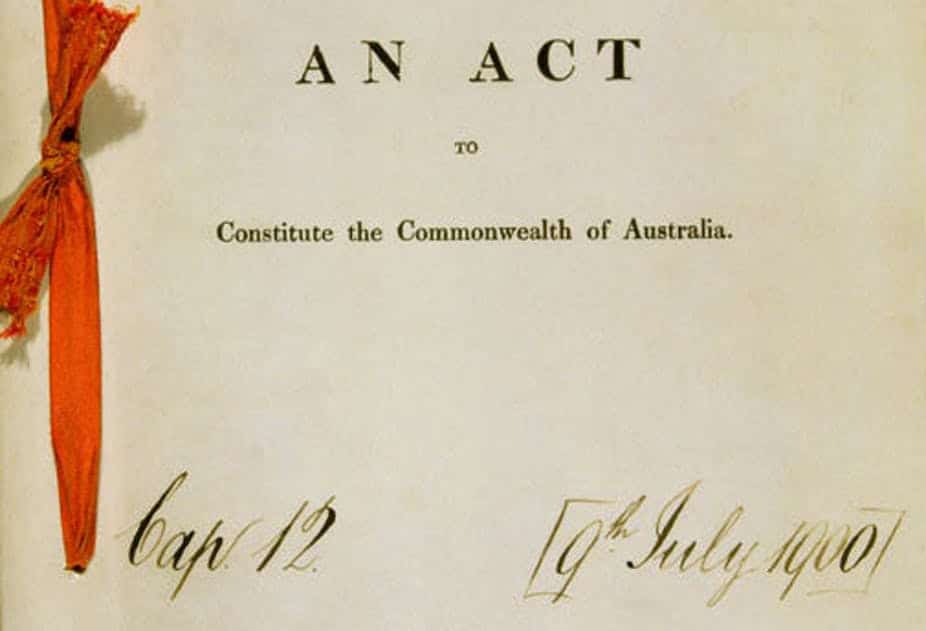Covering Clause 2
The provisions of this Act referring to the Queen shall extend to Her Majesty’s heirs and successors in the sovereignty of the United Kingdom.
NOTE: To point out a very interesting anomaly, it is alleged that the Parliament of the Commonwealth did not have authority or the power (ultra vires) to create the Royal Style and Titles Act 1973. Such an Act is inconsistent or incompatible with Covering Clause 2 of the Constitution Act and section 1 of the Commonwealth Constitution. No Parliament has any authority or the power to create any Law, Statute, Regulation or any other instrument of Law that is inconsistent or incompatible with the Constitution Act or section 1 of the Commonwealth Constitution which of course is part of the Constitution Act.
Royal Style and Titles Act 1973
WHEREAS, in accordance with the Royal Style and Tiles Act 1953, Her Majesty, by Proclamation dated 28th May, 1953, adopted, as the Royal Style and Titles to be used in relation to the Commonwealth of Australia and its Territories, the Style and Titles set forth in the Schedule to that Act:
AND WHEREAS the Government of Australia considers it desirable to propose to Her Majesty a change in the form of the Royal Style and Titles to be used in relation to Australia and its Territories:
NOTE: The words “Government of Australia” is inconsistent or incompatible with section 1 of the Commonwealth Constitution.
Section 1 Legislative power:
The legislative power of the Commonwealth shall be vested in a Federal Parliament, which shall consist of the Queen, a Senate, and a House of Representatives, and which is hereinafter called “The Parliament”, or “The Parliament of the Commonwealth”.
Royal Style and Titles Act 1973.
AND WHEREAS the proposed new Style and Titles, being the Style and Titles set forth in the Schedule to this Act, retains the common element referred to in the preamble to the Royal Style and Titles Act 1953:
Royal Style and Titles Act 1953.
AND WHEREAS the Style and Titles appertaining to the Crown at the time of the enactment of the Statute of Westminster, 1931 had been declared by His then Majesty King George V. in a Proclamation in pursuance of the Royal and Parliamentary Titles Act, 1927 of the United Kingdom, and were, in consequence of the establishment of the Republic of India, subsequently altered with the assent as well of the Parliaments of Canada, Australia, New Zealand and the Union of South Africa as of the Parliament of the United Kingdom:
Royal Style and Titles Act 1973
BE IT THEREFORE enacted by the Queen, the Senate and the House of Representatives of Australia, as follows:
1. This Act may be cited as the Royal Style and Titles Act 1973.
2.
(1) The assent of the Parliament is hereby given to the adoption by Her Majesty, for use in relation to Australia and its Territories, in lieu of the Style and Titles set forth in the Schedule to the Royal Style and Titles Act 1953, of the Style and Titles set forth in the Schedule to this Act.
(2) The Proclamation referred to in subsection (1) shall be published in the Gazette and shall have effect on the date upon which it is so published.
We need to keep in mind the words of Covering Clause 2
Covering Clause 2
The provisions of this Act referring to the Queen shall extend to Her Majesty’s heirs and successors in the sovereignty of the United Kingdom.
Royal Style and Titles Act 1973
Schedule
Section 2
Royal Style and Titles
Elizabeth the Second, by the Grace of God Queen of Australia and Her other Realms and Territories, Head of the Commonwealth.
In 1973 the Commonwealth Government created the Royal Style and Titles Act of 1973, which in turn creates the Queen of Australia.
Covering Clause 2
The Annotated Constitution written by Quick and Garran make the following comments; Page 320 and 323, (relevant part only).
HISTORICAL NOTE
The clause as originally drawn in the Sydney Convention, 1891 (which became the Constitution Act 1900), the words “in the sovereignty” was substituted for “Kings and Queens.” “This Act shall bind the Crown.”
The words “in the sovereignty” was substituted for “Kings and Queens.” point out the influence that Australia had in the creation of the Constitution Act.
The words “Sydney Convention of 1891” was one of the Constitutional Convention Debates and that the framers of the Commonwealth Constitution had all around the Country and used those Constitutional Convention Debates to formulate such Constitution.
The Annotated Constitution written by Quick and Garran make the following comments; Page 320 and 323, (relevant part only).
CROWN NOT BOUND UNLESS NAMED.
It is a recognized principle in the construction of Statute law that in any case where the Crown would be ousted of an existing right, it is not bound, affected, or reached unless named therein either expressly or by necessary implication.
The rights of the Crown are not barred by any Statute of Limitations, unless it is expressly named therein; and this rule extends to cases where the right of the Crown is merely nominal.
PREROGATIVES (Rights).
These are the residuary fractions and remnants of the sovereign power which, unimpaired by legislation and revolution, remain vested in the Crown. They are the products and survivals of the Common Law and are not the creatures of statutes. Statute law tends gradually to invade and diminish the domain of prerogative.
- Section 1 of the Constitution, providing that the legislative power shall be vested in a Federal Parliament consisting of the Queen, the Senate, and the House of Representatives.
- Section 59, restricting the period within which the Queen may disallow laws assented to by the Governor-General.
- Section 62, creating an Executive Council to advise the Governor- General as the Queen’s Representative.
- Section 74, limiting the right of appeal to the Queen in Council.
PREROGATIVES CONFIRMED BY THE CONSTITUTION.
Certain well-known and long-established powers of the Crown instead of being negatived are confirmed by the Constitution, such as:—
(1.) Section 5.—The Governor-General may convene, prorogue, and dissolve the Federal Parliament. (The saga of Whitlam)
Prorogue.
- To postpone or defer.
- To discontinue a session of without dissolution.
- To suspend or discontinue a legislative session.
(2.) Section 62.—The Governor-General may choose and summon members of the Executive Council to advise him.
(3.) Section 64.—The Governor-General may appoint officers to administer such Departments of State as the Governor-General in Council may establish.
(4.) Section 68.—The Governor-General shall be the Commander-in- Chief of the naval and military forces of the Commonwealth.
No doubt, most or the whole, of these and other powers vested in the Governor-General will, in accordance with what have been elsewhere referred to as the “Understandings and Conventions of the Constitutions,” be exercised by the Queen’s Representative in a Constitutional manner, that is, on the advice of responsible Ministers.
Her Majesty’s Heirs and Successors.
The Annotated Constitution written by Quick and Garran make the following comments; Page 323 and 328, (relevant part only).
The Succession to the Crown was, after the revolution of 1688, settled by the Bill of Rights 1688.
Sovereignty of the United Kingdom.
SOVEREIGNTY
The relation of the Commonwealth to the Empire, and the relation of the Federal and State Governments of the Commonwealth to one another, can hardly be appreciated apart from a sound study of the principle of sovereignty.
Before attempting any definition of sovereignty, it is advisable to call attention to the necessity of avoiding confusion between four distinct uses of the word:—
- Legal sovereignty—as when we speak of the sovereignty of the British Parliament;
- Political sovereignty—as when we speak of the sovereignty of the people;
- Titular (supposed) sovereignty—as when we speak of the sovereignty of the Queen;
- Delegated Sovereignty— as when we speak of the sovereignty of the British Parliaments delegated right of self-government on British colonies (Australia is one).
- LEGAL SOVEREIGNTY: Sovereignty, then, is an attribute, and the most essential attribute, of a State, that is, of an independent political community. It is defined as “original, absolute, unlimited, universal power over the individual subject and over all associations of subjects.” The legal sovereign is that person, or determinate body of persons, which possesses, in a State, a power which in point of law is absolute and unlimited. Such a body is the British Parliament. Such a body are the electors of the Commonwealth of Australia again organized under the Constitutional. True political science seems to point to the conclusion that sovereignty is incapable of legal limitation, either from without or within. A sovereign body cannot be legally controlled by another body, for then that which controls would be sovereign.
- POLITICAL SOVEREIGNTY: Political sovereignty has been incidentally defined in our discussion of legal sovereignty. As a legal conception, a sovereign is one whose commands, whether just or unjust, wise or unwise, the courts will enforce. With political sovereignty the courts have nothing to do. They cannot recognize the “general will” of the political sovereign, but only the manifestation of that will as declared by the legal sovereign. That body is politically sovereign or supreme in a State the will of which is ultimately obeyed by the citizens of the State. As a matter of law, some jurists (One who has thorough knowledge of the law; esp., a judge or an eminent legal scholar) have contended that the Queen is the supreme administrator and supreme legislator, acting by and with the advice of ministers in matters of administration, and by and with the advice and consent of Parliament in matters of legislation. For good or for evil, the movement in favour of the Referendum—which finds a place in this Constitution as a means for the alteration of the organic law tends in this direction.
- TITULAR (supposed) SOVEREIGNTY: This term is used to designate the king, or queen, of the United Kingdom; often also in the phrase ‘Our Sovereign Lord the King,’ or ‘Our Sovereign Lady the Queen,’ in Acts of Parliament and proclamations.
- DELEGATED SOVEREIGNTY: In all the constitutional Acts passed by the British Parliament conferring the right of self-government on British colonies, it is expressed or implied that the sovereignty is vested in the Queen. This form of expression is in accordance with traditional theory and usage and it has been continued as a matter of courtesy, notwithstanding (Despite) the fact that the form is at variance with the reality and the substance as elsewhere pointed out, the Queen shares with the Houses of the British Parliament in the sovereignty of the British Empire. Within the limits of their constitutional Acts and charters, such governors and parliaments may exercise all the ordinary authority of a sovereign, in the same way as the Queen in the British Parliament, subject only to the same moral checks and restraints. The constitutional Acts of the colonies of Great Britain are illustrations of this delegation of sovereign power. Most of these colonies possess Statutory Constitutions, conferring on their respective legislature, together with the Queen, represented by a governor, authority to legislate for the peace, order, and welfare of the people within their respective territories. The Constitution of the Australian Commonwealth is an even more notable instance of the same process. But colonies, dominions, or commonwealths, having such a system of government, substantially free and practically independent, are still subject to the original sovereign body, the Queen in the British Parliament. That power, though dormant, is not extinguished or abandoned by the delegation.
In Australia the people are sovereign over and above all parliaments, but not either the Queen or the Parliament of the United Kingdom.
Authorised by Ian Nelson for the Great Australian Party, 65 Cardinal Cct, Caboolture, 4510






